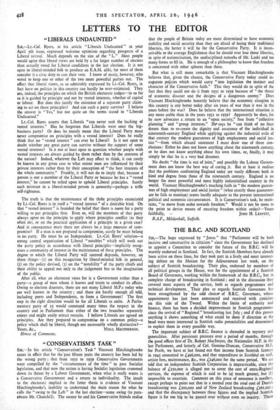" CONSERVATISM'S TASK "
SIR,—In his article " Conservatism's Task " Viscount Hinchingbrooke states in effect that for the past fifteen years the country has been led by the wrong party ; that from 5931 to 1939 Conservative Governments were compelled by the " circumstances of the time " to pass Socialist legislation, and that now the nation is having Socialist legislation crammed down its throat by a Labour Government, when what it really wants is a Conservative Government and a return to individuality. The insult to the electoral: implied in the latter thesis is evidence of Viscount Hinchingbrooke's inability to understand the main reason for what he calls the " swing to the Left " in the last election—some swing (to para- phrase Mr. Churchill). The sooner he and his Conservative friends realise that the people of Britain today are more determined to have economic stability and social security than they are afraid of losing their traditional liberties, the better it will be for the Conservative Party. It is incon- ceivable to the average Englishman that he should ever lose those liberties, in spite of nationalisation, the undisciplined remarks of Mr. Laski and too many forms to fill in. He is enough of a philosopher to know that freedom is concerned with other spheres than these.
But what is still more remarkable is that Viscount Hinchingbrooke believes that, given the chance, the Conservative Party today could in- augurate policies which would carry " into legislation the instinct and character of the Conservative faith." This they would do in spite of the fact that they could not do it from 1931 to 5939 because of " the threat of economic disaster and the designs of a dangerous enemy." Does Viscount Hinchingbrooke honestly believe that the economic situation in this country is any better today after six years of war than it was in the years before the war? Does he believe that the international situation is any more stable than in the years 1931 to 5939? Apparently he does, for he now advocates a. return to an "open society," free from "collective planning " and " group interests." He says he " can think of no finer dream than to re-create the dignity and assurance of the individual in nineteenth-century England while applying against the industrial evils of that century the modern guarantees of high employment and social jus- tice "—from which absurd statement I must draw one of three con- clusions: Either he does not know anything about the nineteenth century, or he does not know anything about his own times, or, finally, it may simply be that he is a very bad dreamer.
No doubt " the time is out of joint," and possibly the Labour Govern- ment does not know the best way of curing .it. But at least it realises that the problems confronting England today are vastly different both in kind and degree from those of the nineteenth century. England is no longer the most powerful and most highly industrialised country in the world. Viscount Hinchingbrooke's touching faith in " the modern guaran- tees of high employment and social justice" (what exactly these guarantees are he fails to mention) seems hardly adequate in the present international political and economic circumstances. It is Conservatism's task, he main- tains, " to move from order towards freedom." Would it not be more to the point to devise means of ensuring freedom within order?—Yours


























 Previous page
Previous page